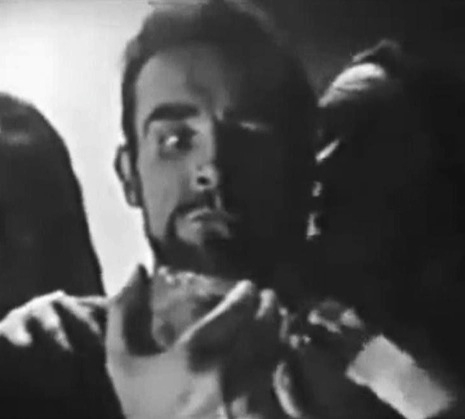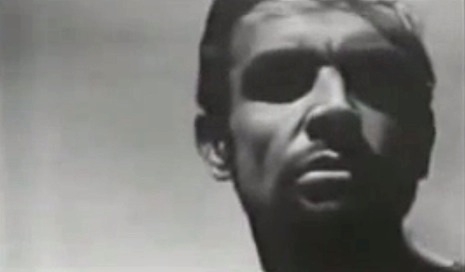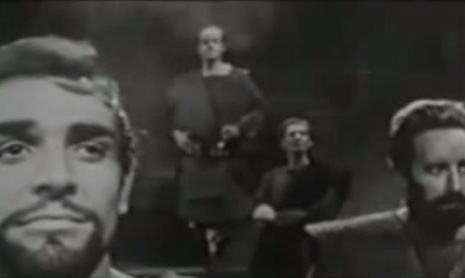
Shean Connery does Shakespeare? Shurely there’s shome mishtake?
Well no, for as Michael Caine once said, Sean Connery was always “a much better actor than just playing James Bond.” This can be seen by his performances in Hitchcock’s Marnie, or his first three films with Sidney Lumet—as military prisoner Joe Roberts in the outstanding The Hill, the eponymous crook in The Anderson Tapes, and one of his finest performances as a detective on the verge of a nervous breakdown in The Offence. Then, of course, there’s John Boorman’s Zardoz, or his performance alongside Caine in John Huston’s The Man Who Would Be King, or as a space marshall in Peter Hyams’ Outland, or as the maverick characters in The Name of the Rose, The Hunt for Red October, The Rock, Gus Van Sant’s Find Forrester and so on and so on. That his final films aren’t so good is down to poor choices and the moronic commercialization of Hollywood by producers who would be more suited to working as junior office clerks or assistants in shoe shops. That said, if only Connery had agreed to come out of retirement and play Gandalf in Lord of the Rings, how different this may have been. (The actor was even offered 15% of the box office gross, for which he’d have personally made out with $400 million!)
In 1961, the year before he became internationally famous as Bond in Dr. No, Connery gave a critically acclaimed performance in a Canadian television production of William Shakespeare’s Macbeth—or the “Scottish Play” as it is sometimes called by very superstitious actors. Shot in a studio in Toronto in a rather stylized manner—with few props or sets, using big close-ups and tilted camera angles—the production shows Connery is more than competent at delivering the Bard’s lines.
Macbeth tells the story of an ambitious soldier whose meeting with three witches (or “Weird Sisters”) on a “blasted heath” after a battle convinces him he will one day become King of Scotland. The witches hail Macbeth as Thane of Glamis, and predict he will soon be Thane of Cawdor and King therefafter. These predictions set Macbeth off on a murderous path that will eventually prove his undoing.

There’s an interesting connection between Macbeth and the hacktivist group Anonymous and that is Guy Fawkes—the infamous Papist plotter who planned (along with eleven others) to blow up the English House of Parliament on November 5th, 1605. This was the Gunpowder Plot and its failure is still celebrated today in the UK as Guy Fawkes Night or Bonfire Night.
Fawkes’ bearded features have long been reproduced on cardboard masks for children to wear during Bonfire celebrations. This Guy Fawkes mask was reinterpreted by illustrator David Lloyd for the character “V” in Alan Moore’s V for Vendetta and has since become a recognizable avatar for Anonymous and the Occupy movement.
Apart form being very loosely based on a real Scottish King, Shakespeare’s Macbeth was written as piece of flattering propaganda for the new English King James I, who was also James VI of Scotland.

James was the son of Mary Queen of Scots and inherited the English throne from Queen Elizabeth I in 1603 after she died without issue. The English were suspicious of this dour Scottish Calvinist taking reign of their country and there was one attempted coup before the infamous Gunpowder Plot of 1605. In response to this plot, Shakespeare wrote Macbeth as a way to “flatter King James,” as the scholar A. L. Rowse wrote in his biography of Shakespeare:
...his Majesty received a great shock with the exposure of the Gunpowder Plot, 5 November 1605, which was to have blown him and his family, with all the Lords and Commons assembled in Parliament, sky high at the hands of the extreme wing of young Catholic malcontents. These events are not only reflected in Shakespeare’s play Macbeth, but I think it fairly clear that the conception of such a play was suggested by them….Shakespeare, ever-responsive to the public mood, was inspired to write a play to do honour to the dynasty’s legendary forbear, Banquo, and thus to the King.
....[Macbeth] pays more tribute to the Scottish King than ever the dramatist had paid to the English Queen in all his previous work….in Macbeth we have tributes paid to Banquo, the mythical ancestor of [King James], to his ‘royalty of nature’, the dauntless temper of his mind’, the wisdom that doth guide his valour,’ while we are constantly reminded of the [witches’] prophecy that [Banquo]...shalt get kings, though thou be none.
Similarly [King James’s] personal interest in witches and demonology is catered for by the dominating influence exerted by the Weird Sisters, who are really incarnations of evil. James had written a book on demonology in Scotland, which Shakespeare read up for his play along with other Scottish lore: this Calvinist was very sure that witches and demons existed, where Queen Elizabeth, a sensible Erasmian, gave no such thought to such matters. King James knew that it was the witches who had raised up the storm that made his crossing the North Sea to marry Anne of Denmark so very unpleasant.
While Shakespeare flattered the new King, he did much to discredit the real Macbeth, who had been a successful ruler of Scotland from 1040 until 1057. He was no murderous tyrant but was described as “renowned” and gave equal rights to women during his reign and shared wealth amongst the people of Scotland—something quite unheard of at that time.
The camera loves Sean Connery and he certainly gives a good interpretation of Macbeth, and is ably supported by Zoe Caldwell as Lady Macbeth, William Needles as Banquo, Ted Follows as Macduff, Robin Gammell as Malcolm and Sharon Acker as Lady Macduff. This Canadian television production was directed by Paul Almond.





